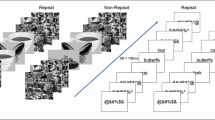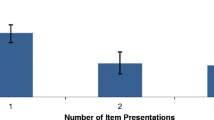Abstract
N. Kanwisher observed that subjects shown rapid lists of words recall two occurrences of a repeated word less often than two unrelated words. Kanwisher explained this “repetition blindness” through a type/token account, which assumes that encoding the second occurrence of a repeated word is inhibited if it occurs too soon after the first. More fundamentally, it assumes that failure to recall a word from a rapid list results from failure to encode its occurrence. Contrary to that interpretation, we observed that subjects can often recognize words that they cannot recall from a rapid list. We also observed “reverse repetition blindness,” when the second presentation was given greater contextual support, and a “release from repetition blindness” effect, when distinctive contextual support was given to each occurrence. We concluded that a constructive account of remembering provides a better explanation of all of the effects.
Similar content being viewed by others
References
Anderson, J. R., & Bower, G. H. (1973). Human associative memory. Washington, D.C.: Winston.
Armstrong, I. T., & Mewhort, D. J. K. (1995). Repetition deficit in RSVP displays: Encoding failure or retrieval failure? Journal of Experimental Psychology: Human Perception and Performance. 21, 1044–1052.
Bartlett, F. C. (1932). Remembering: A study in experimental and social psychology. Cambridge: Cambridge University Press.
Bavelier, D., & Potter, M. C. (1992). Visual and phonological codes in repetition blindness. Journal of Experimental Psychology: Human Perception and Performance. 18, 134–147.
Downing, P., & Kanwisher, N. G. (1995). Types and tokens unscathed: A reply to Whittlesea, Dorken and Podrouzek. Journal of Experimental Psychology: Learning, Memory and Cognition, 21, 1698–1702.
Gardner, J. M., Craik, F. I. M., & Birtwhistle, J. (1972). Retrieval cues and release from proactive inhibition. Journal of Verbal Learning and Verbal Behavior. 11,778–783..
Jacoby, L. L., Kelley, C. M., & Dywan, J. (1989). Memory attributions. In H.L. Roediger & F.I.M. Craik (Eds.), Varieties of memory and consciousness: Essays in honour of Endel Tulving (pp. 391–422). Hillsdale, NJ: Erlbaum.
Kanwisher, N. G. (1987). Repetition blindness: Type recognition without token individuation. Cognition, 27, 117–143.
Kanwisher, N., & Potter, M. C. (1989). Repetition blindness: The effects of stimulus modality and spatial displacement. Memory & Cognition, 17, 117–124.
Kanwisher, N. G., & Potter, M. C. (1990). Repetition blindness: Levels of processing. Journal of Experimental Psychology: Human Perception and Performance. 16, 30–47.
Mandler, G. (1980). Recognizing: The judgement of previous occurrence. Psychological Review. 87, 252–271.
Masson, M. E. J., Caldwell, J. I., & Whittlesea, B. W. A. (1996). When lust is lost: Orthographic similarity effects in the encoding and reconstruction of rapidly presented word lists. Manuscript submitted for publication.
Park, J., & Kanwisher, N. (1994). Determinants of repetition blindness. Journal of Experimental Psychology: Human Perception and Performance. 20, 500–519.
Tulving, E. (1983). Elements of episodic memory. NY: Oxford University Press.
Tulving, E. (1995). Organization of memory: Quo vadis? In M. Gazzaniga (Ed.), The cognitive neurosciences. Cambridge, MA: MIT Press.
Tulving, E., & Psotka, J. (1971). Retroactive inhibition in free recall: Inaccessibility of information available in the memory store. Journal of Experimental Psychology. 87, 1–8.
Tulving, E., & Thompson, D. M. (1973). Encoding specificity and retrieval processes in episodic memory. Psychological Review. 80, 352–373.
Whittlesea, B. W. A. (1993). Illusions of familiarity. Journal of Experimental Psychology: Learning, Memory, and Cognition. 19, 1235–1253.
Whittlesea, B. W. A., & Podrouzek, K. W. (1995). Repeated events in rapid lists: Part 2. Remembering repetitions. Journal of Experimental Psychology: Learning, Memory and Cognition. 21, 1689–1687.
Whittlesea, B. W. A., Dorken, M. D., & Podrouzek, K. W. (1995). Repeated events in rapid lists: Part 1. Encoding and representation. Journal of Experimental Psychology: Learning, Memory and Cognition. 21, 1670–1688.
Wickens, D. D. (1973). Some characteristics of word encoding. Memory & Cognition. 1, 485–490.
Author information
Authors and Affiliations
Corresponding author
Rights and permissions
About this article
Cite this article
Whittlesea, B.W.A., Wai, K.H. Reverse “repetition blindness” and release from “repetition blindness”: Constructive variations on the “repetition blindness” effect. Psychol. Res 60, 173–182 (1997). https://doi.org/10.1007/BF00419765
Received:
Accepted:
Issue Date:
DOI: https://doi.org/10.1007/BF00419765




